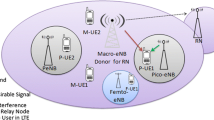Abstract
Channel-state-aware scheduling strategies on wireless links play an essential role for enhancing throughput performance of elastic data traffic by exploiting channel fluctuations. Especially in HSDPA (High-Speed Downlink Packet Access), while various channel-state-aware schedulers have been proposed, each of them has pros and cons, and thus, none of them can be the best solution for all situations and policies in the base station management. To respond to the variety of the base station management, in our previous paper, a unified scheduler that can flexibly vary its characteristics by adjusting its parameters was proposed, but only the basic packet-level performance was evaluated. In this paper, therefore, the detailed performance characteristics of the proposed unified scheduler are investigated. First, it is shown that the unified scheduler meets a general fairness criterion—( p ,α )-proportional fairness—in terms of the asymptotic behavior of the long-term averaged throughput. Second, the TCP-level throughput performance of the unified scheduler with some link-layer technologies actually employed in HSDPA is evaluated by network simulation. Lastly, two scenarios to set the parameters of the scheduler—the semi-proportional fair scheduling and the semi-greedy scheduling—are examined, which demonstrate the flexibility and effectiveness of the unified scheduler.
Access this chapter
Tax calculation will be finalised at checkout
Purchases are for personal use only
Preview
Unable to display preview. Download preview PDF.
Similar content being viewed by others
References
3GPP: High Speed Downlink Packet Access (HSDPA); overall description. Technical Specification 25.308, Version 5.4.0, Release 5, 3GPP, Sophia Antipolis, France (2003)
Lu, S., Bharghavan, V., Srikant, R.: Fair scheduling in wireless packet networks. IEEE/ACM Transactions on Networking 7, 473–489 (1999)
Jalali, A., Padovani, R., Pankaj, R.: Data throughput of CDMA-HDR a high efficiency-high data rate personal communication wireless system. In: IEEEVichuliarTechnology Conference 2000, pp. 1854–1858 (Spring 2000)
Bender, P., et al.: CDMA/HDR: A bandwidth-efficient high-speed wireless data service for nomadic users. IEEE Communications Magazine 38, 70–77 (2000)
Liu, X., Chong, K., Shroff, N.: Opportunistic transmission scheduling with resource sharing constraints in wireless networks. IEEE Journal on Selected Areas in Communications 19, 2053–2064 (2001)
Borst, S., Whiting, P.: Dynamic rate control algorithms for HDR throughput optimization. In: IEEE INFOCOM 2001, pp. 976–985 (2001)
Viswanath, P., Tse, D., Laroia, R.: Opportunistic beamforming using dumb antennas. IEEE Transactions on Information Theory 48, 1277–1294 (2002)
Liu, Y., Gruhl, S., Knighly, E.: WCFQ: an opprutnistic wireless scheduler with statistical fainress bounds. IEEE Transactions onWireless Communications 2 (2003)
Panigrahi, D., Khaleghi, F.: Enabling trade-offs between system throughput and fairness in wireless data scheduling techniques. In: World Wireless Congress (3GWireless) (2003)
Kelly, F.: Charging and rate control for elastic traffic. European Transactions on Telecommunications 8, 33–37 (1997)
Ohta, Y., Tsuru, M., Oie, Y.: Framework for fair scheduling schemes in the next generation high-speed wireless links. In: the 8th International Conference on Cellular and Intelligent Communications (CIC 2003), p. 411 (2003)
Mo, J., Walrand, J.: Fair end to end window-based congestion control. IEEE/ACM Transactions on Networking 8, 556–567 (2000)
3GPP: Pyisical layer aspects of UTRA high speed downlink packet access. Technical Report 25.848, Version 4.0.0, Release 4, 3GPP, Sophia Antipolis, France (2001)
3GPP: Radio link control (RLC) protocol specification. Technical Specification 25.322, Version 5.4.0, Release 5, 3GPP, Sophia Antipolis, France (2003)
3GPP: Media access control (MAC) protocol specification. Technical Specification 25.321, Version 5.4.0, Release 5, 3GPP, Sophia Antipolis, France (2003)
Koga, H., Ikenaga, T., Hori,Y., Oie,Y.: Out-of-sequence in packet arrivals due to layer 2ARQ and its impact on TCP performance inW-CDMA networks. In: Symposium on Applications and the Internet 2003 (SAINT 2003), pp. 398–401(2003)
Koga, H., Kawahara, K., Oie, Y.: TCP flow control using link layer information in mobile networks. In: SPIE Conference of International Performance and Control of Network Systems III, pp. 305–315 (2002)
Bakre, A., Badrinath, B.: I-TCP: Indirect TCP for mobile hosts. In: International Conference on Distributed Computing Systems, pp. 136–143 (1995)
Balakrishnan, H., Seshan, S., Katz, R.H.: Improving reliable transport and handoff performance in cellular wireless networks. ACMWireless Networks 1, 469–481 (1995)
Bertsekas, D., Gallager, R.: 6. In: Data Networks, 2nd edn., Prentice-Hall, Englewood Cliffs (1991)
VINT Project Network Simulator (ns-2), http://www.isi.edu/nsnam/ns/
Floyd, S., Henderson, T.: The NewReno modification to TCP’s fast recovery algorithm. RFC2582 (1999)
Author information
Authors and Affiliations
Editor information
Editors and Affiliations
Rights and permissions
Copyright information
© 2004 Springer-Verlag Berlin Heidelberg
About this paper
Cite this paper
Ohta, Y., Tsuru, M., Oie, Y. (2004). Fairness Property and TCP-Level Performance of Unified Scheduling Algorithm in HSDPA Networks. In: Freire, M.M., Chemouil, P., Lorenz, P., Gravey, A. (eds) Universal Multiservice Networks. ECUMN 2004. Lecture Notes in Computer Science, vol 3262. Springer, Berlin, Heidelberg. https://doi.org/10.1007/978-3-540-30197-4_19
Download citation
DOI: https://doi.org/10.1007/978-3-540-30197-4_19
Publisher Name: Springer, Berlin, Heidelberg
Print ISBN: 978-3-540-23551-4
Online ISBN: 978-3-540-30197-4
eBook Packages: Springer Book Archive





